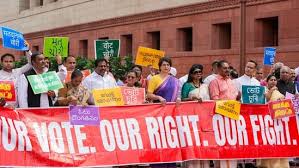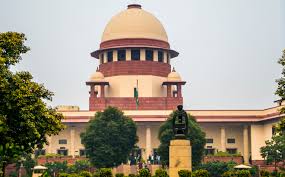Vote Theft in India: Democracy Under Threat
India takes pride in being the world’s largest democracy, where every citizen’s vote is supposed to shape the nation’s future. But what if that vote isn’t safe? Over the past few years, opposition parties, activists, and even ordinary voters have raised alarming questions about electoral fairness. From mysterious glitches in voting machines to missing names on voter lists, the whispers of vote theft are growing louder. Are these just political accusations, or is there a real threat to India’s democratic foundation?
In the 2024 general elections, something felt off. Opposition leaders from parties like the Congress and AAP claimed that EVMs (Electronic Voting Machines) were behaving strangely showing incorrect counts, freezing, or even switching votes. In Madhya Pradesh, a candidate leading by thousands of votes suddenly found himself losing after a “technical reset.” In Rajasthan, voters reported that their chosen candidate’s symbol didn’t match the slip printed by the VVPAT (Voter Verifiable Paper Audit Trail).
These aren’t just baseless allegations. Ordinary people shared videos and testimonies, yet the Election Commission dismissed most complaints, calling them “isolated incidents.” But when multiple states report similar issues, can we really ignore them?
EVMs: A Black Box.
EVMs were introduced to make elections cleaner, replacing the old paper ballots that were prone to booth capturing and tampering. But now, the machines themselves are under suspicion.
In 2019, a group of engineers demonstrated how EVMs could be hacked using a hidden device. The Election Commission denied it, but they’ve never allowed a truly independent test. The VVPAT system was supposed to add transparency every vote casts a paper slip that voters can see. But here’s the catch: only a tiny fraction of these slips are actually counted and matched with the EVM results. If 99% of votes aren’t cross-checked, how can we be sure they’re accurate?
Opposition parties have been demanding 100% VVPAT verification, but the EC refuses, saying it’s too time-consuming. Conducting fair elections are integral part of a democratic country.
Even if EVMs were flawless, other tricks seem to be at play. Before elections, opposition leaders often face sudden raids by agencies like the ED and CBI. Is it a mere coincidence. Many voters don’t think so. In Uttar Pradesh and West Bengal, reports surfaced of voters being threatened, names mysteriously disappearing from rolls, and polling booths being relocated at the last minute to confuse voters.
Then there’s the more subtle manipulation flooding key constituencies with freebies and welfare schemes just before voting. Is this genuine development, or a way to buy or manipulate votes.
A History of Electoral Fraud
This isn’t India’s first brush with vote theft. In the 1970s and 80s, goons would literally capture polling booths, stuffing ballot boxes with fake votes. EVMs reduced that kind of blatant fraud, but if machines can be tampered with, have we really solved the problem?
Even developed democracies like the U.S. and Germany use paper ballots alongside electronic systems for verification. Why is India resisting a similar safeguard?
Democracy isn’t just about voting it’s about trust. If people start believing their votes don’t matter, they’ll stop participating. Already, India’s ranking in global democracy indexes has slipped, with critics calling it a “flawed democracy.”
What Can Be Done?
- Count Every VVPAT Slip – If the machine says X, but the paper says Y, which one do we trust?
- Independent EVM Testing – Let tech experts, not just government officials, examine the machines.
- Clean Up Voter Lists – No more “missing voters” or fake entries.
- Stop Pre-Election Raids – Law enforcement should work without political bias
The opposition’s allegations can’t be brushed aside as mere politics. When voters feel cheated, democracy weakens. India’s elections need to be beyond doubt transparent, verifiable, and fair. Otherwise, the world’s largest democracy might slowly become a democracy in name only.
The question isn’t just about who wins or loses an election. It’s about whether every Indian can still believe in the power of their vote. And right now, that belief is shaking.





